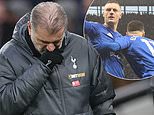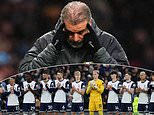A man who 'died' three times in a single day as a child has detailed what he saw 'in heaven' and a haunting confession.
Landon Kemp was just eight years old when, in 1997, he and his family were involved in horrific car accident.
The Kemps, who were driving home from church in Carolina in the US, were struck side-on by an ambulance at an intersection.
Landon's father, Andy, was killed instantly and the car was so mangled that initially emergency services didn't realise there was child in the vehicle needing rescue.
His mother, Julie, who was also in the car at the time and was treated at the scene, recalled in a YouTube video how she believed her son was dead.

'They couldn't see his body because of the damage that was done to the drivers' side of the car,' she said.
'When they saw Landon's shoe, it took a deeper search for his body.
'When they pulled Landon out, from the back of the car, he was not breathing.'
Responders managed to resuscitate Landon, and he was immediately flown from the scene by emergency aircraft to Carolina's Medical Center.
He would die twice more that day, but each time medics managed to resuscitate him.
But even then, with Julie now conscious, doctors said her son may be permanently brain damaged due to the sustained lack of oxygen he had experienced.
However, not only did Landon miraculously avoid brain damage he is one of a handful of people to experience near-death-experiences, saying he temporarily went 'to heaven'.
These phenomena, which have been recorded around the globe, are a source of fascination for medics and the public alike and are a general term for things people perceive as experiencing when clinically dead.

In Landon's case he claims to have seen the afterlife.
Julie recalls that, upon Landon waking, she went to tell him of his father's death, but she was interrupted when her son said he already knew because he had seen his father in heaven.
Landon, 35, still keenly recalls his experience.
'I remember being able to see my dad and his friend Olan Palmer, who had passed away less than a month before he did,' he said.
'And Olan's son, Neal Palmer, who had died on a four-wheeler years before.
'Never one of us said a word to each other but we were just all standing there.'
Landon also claims to have met two of his siblings with Julie having had two miscarriages during two previous pregnancies before her son was born.
He recalled: 'I knew that they were my siblings even though no one had ever told me about them.
'Just being in heaven, I guess you know your own or you know who everyone is.'
Landon added that during each of his 'deaths' he had a different experience and in one he met Jesus.

'Jesus came to me and told me that I have to go back to Earth and be a good Christian and tell others about him.'
Experiences, like those Landon went through, of seeing and hearing things whilst clinically dead do have some scientific basis.
For years studies have shown the human brain still functions normally for a very brief time after the heart stops.
However, further research has revealed that the brain can still experience sporadic bursts of activity even after an hour without oxygen, during resuscitation.
This post clinical death activity is at levels normally associated with higher mental function, such as thinking and imagining.
Such discoveries have led to some medics calling for an overhaul of standard practice of people being declared dead after three-to-five minutes of oxygen deprivation, as these patients could still in theory be resuscitated.
Research into near-death-experiences has shown people who undergo them can experience a variety of differing sensations, but many share a common theme.
These include out of body experiences, bright lights at the end of a tunnel, meeting deceased relatives or seeing their life flash before their eyes.

Some recall seeing a heavenly afterlife whilst others claim to have seen demons and visiting hell.
While evidence on something happening in brains after clinical death is still being explored, exactly why so many people have similar experiences remains an issue of contention among experts.
Some theorise that as the brain is undergoing these changes essentially the 'brakes' come off the system and this opens our perception to incredibly lucid and vivid experiences of stored memories from anytime in our life.
However, this is only a theory and other experts dispute this.
It should be noted that clinical death differs from brain death.
Brain death is when a person on an artificial life support machine no longer has any brain function, which means they will not regain consciousness.
Such patients have no chance of recovery because their body is unable to survive without artificial life support.

In the UK this means a person who has suffered brain death is legally dead.
This can be difficult to comprehend for families of the deceased as they can see their loved one's chest rise and fall with every breath from the ventilator as well as their heart continuing to beat.
Brain death can be caused by both illness and injury when blood and/or oxygen supplies are cut off to the vital organ.
The condition is different from a vegetative state where a patient's brain function remains.












